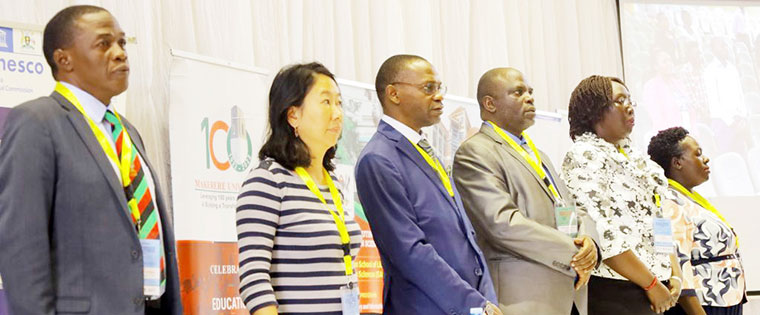A nation’s strength stems from its knowledge – Prof Umar Kakumba
Prof Umar Kakumba, Makerere University vice chancellor for Academic Affairs, has stressed the crucial importance of knowledge to any country’s strength and reputation.
“The strength of a nation is measured largely by the quality of character and proficiency of its people; but beneath the people is their knowledge. People are not just human beings moving around, and knowledge doesn’t just emerge from space. Knowledge has to be generated, managed, preserved and passed on,” he said.
Kakumba was officially opening a two-day hybrid seminar on ‘Preventive conservation and disaster prevention of documentary heritage in Africa’ at Yusuf Lule Central Teaching Facility auditorium on July 4, 2023. Funded by the Japanese government through the UNESCO Memory of the World Programme, the seminar was co-hosted by Makerere University and UNESCO Uganda National Commission (UNATCOM).
Prof Elisam Magara of the East African School of Library and Information Science, was the convener of the invite-only seminar while Lothar Jordan, chairperson of subcommittee on Education and Research of UNESCO Memory of the World programme, gave the keynote speech, online.
Narrating several threats to memory documents such as water, theft and vandalism, humidity, fire, insects, and rodents, Jordan said globally fire is the greatest destroyer of documents.
Jordan called for governments and institutions to devise good emergency plans that are not drowned in technical complexities and jargon, so that many lay people or end users can prevent or reduce the extent of destruction in case of disasters.
The seminar addresses a wide variety of topics and activities such as sharing experiences and reflections, risks and challenges, draft guidelines on preventive preservation/conservation strategies, and the way forward
AVOIDING HEADLESS GENERATIONS
The deputy vice chancellor emphasized the need for every individual, community, people and entire humanity to preserve information and knowledge about their history and experiences for safe passage to future generations.
“We must preserve the knowledge and the records in which it is kept; these constitute our heritage. Without them, new generations will be headless, and will move with no sense of direction,” he argued.
Kakumba noted that, globally, universities have always and continue to play a big role in preserving knowledge and memory.
“No institution can grow strong and stronger without preserving what it has been accumulating over the years and decades,” he said.
He said Makerere has been archiving a lot of memory, as a university and as a United Nations document depository centre.
He said when the Main Building caught fire in 2020, the student records of almost 100 years were safely kept somewhere. Although the staff records in the building got burnt, the university had a year earlier started on digitizing them.
He noted that for many years, universities in Africa maintained a special archive section in their libraries known as Africana, for rare heritage materials. And Makerere’s library has been a depository of many materials from the East African region. The library’s legal status since the legislation of the Makerere University (Deposit Library) Act 1958 has enabled it to operate or network with several affiliate document storage centres.
“Further than that, Makerere University has gone ahead to update its policies and regulatory framework so that we consistently keep the importance of documents. We recently passed a policy on academic records and accessibility and sharing of information. The policy makes it mandatory for staff members and students to abide by it,” Kakumba added.
Kakumba said Makerere is in the process of setting up of Muteesa II Memorial museum and that when the university’s main administration building is reconstructed, it will contain another museum.
UNATCOM CELEBRATES 60 YEARS
Rosie Agoi, secretary general of UNATCOM, announced that their national committee is celebrating 60 years this year; and this seminar is one of the yearlong activities that will reach climax in September.
She noted that there are many risks and threats that face the preservation, circulation and accessibility of memory; some are institutional, others are non-institutional.

